|
|
|
Sort Order |
|
|
|
Items / Page
|
|
|
|
|
|
|
| Srl | Item |
| 1 |
ID:
160010
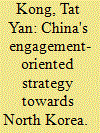

|
|
|
|
|
| Summary/Abstract |
In response to the challenge of unstable North Korea (weak economy, weapons of mass destruction [WMD] development), China has followed an engagement-oriented strategy based on diplomatic persuasion, economic interaction and moderate economic sanctions. Intensified engagement (2009–2012) facilitated North Korean convergence with China in respect of economic reform but divergence has persisted over WMD development. Despite the widening of divergence since 2013, China has refrained from applying crippling sanctions. This article seeks to explain these diverging results and their implications for China's strategy towards North Korea. Reviewing recent literature and data, it will argue that Chinese economic input reinforced the trend of economic reform that formed the basis of political consolidation under the new hereditary regime. On the other hand, the prospect of stable dependence on China ran counter to that regime's pursuit of WMDs as the basis of security and diplomatic diversification. These mixed results reveal the limits of China's strategy: its economic input involuntarily reinforces North Korea's WMD potential but it is not prepared to accept the risks of enforcing WMD restraint by crippling sanctions either. With limited room for manoeuvre, the attainment of China's strategic objectives ultimately depends upon policy change from the US or South Korea.
|
|
|
|
|
|
|
|
|
|
|
|
|
|
|
|
| 2 |
ID:
177862
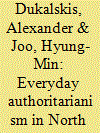

|
|
|
|
|
| Summary/Abstract |
This article examines the political consequences of widespread social changes in North Korea to illuminate how, if at all, shifts in everyday life influence the power of an autocratic government. Our study is based on 23 interviews with North Korean defectors in 2017 and supplemented by interviews conducted in previous years. The main finding is that social practices associated with marketisation, flows of information, and increased corruption have not yet provided the foundation for collective challenges to the regime. It is, however, also clear that official norms, rules, and institutions have been significantly weakened to adapt to new social realities.
|
|
|
|
|
|
|
|
|
|
|
|
|
|
|
|
| 3 |
ID:
120465
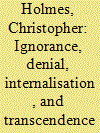

|
|
|
|
|
| Publication |
2013.
|
| Summary/Abstract |
In this article, I suggest what an engagement between post-structuralism and the work of Karl Polanyi might look like. I do this by presenting a reading of Polanyi's concept of 'double movement' as a form of problematisation through binary opposition. I suggest that the central opposition that the double movement depicts - between economy and society as reflected in processes of marketisation and social protection - presents itself in such a way that the problems emanating from the opposition can only be solved through its transcendence. On one hand, the terms of transcendence are limited by the terms of the opposition. On the other hand, since transcendence is never reached, the double movement problematisation stabilises the existence of a lacuna between the lived experience of market society and the discursive field of that market society. As such, the form of the problematisation places a double-limit upon the ways in which 'solutions' can be presented. I present this thesis in relation to two instances of double movement discussed by Polanyi in his book, The Great Transformation. I then apply the argument to invocations of the economy-society opposition in contemporary political economic discourse, where it remains as ubiquitous as ever.
|
|
|
|
|
|
|
|
|
|
|
|
|
|
|
|
| 4 |
ID:
179129
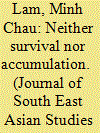

|
|
|
|
|
| Summary/Abstract |
Building on ethnographic fieldwork in a northern Vietnamese village, this article explores how rural households have negotiated the opportunities and uncertainties of marketisation (Đổi Mới). I focus on the surprising ways local households have handled the state's push to diversify livelihoods and adopt commercial home-based sidelines: by means of being đa gi năng, a local term that means ‘keeping many livelihood options and never putting all eggs in one basket’. In pursuit of đa gi năng, local households have actively adopted home-based production even when they were doing well with paddy farming and faced no subsistence crisis. However, they have evaded what state officials want most: specialising in a single home-production enterprise in rational maximising ways to accumulate transformational wealth. The idea of đa gi năng calls into question two contrasting universal approaches to rural households’ motivations for livelihood diversification: either a desperate search for survival by passive victims of market forces, or a quest for wealth accumulation by rational maximisers without careful judgement of potential risks to one's family.
|
|
|
|
|
|
|
|
|
|
|
|
|
|
|
|
| 5 |
ID:
153728
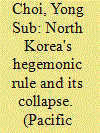

|
|
|
|
|
| Summary/Abstract |
Ideological leadership through the Party was at the core of the North Korean leaders’ hegemonic rule over the people, which resulted in the great popularity of Kim Il-sung. Marketisation in the wake of the economic crisis, however, significantly impaired the mechanism for rule by consent, especially by triggering the influx of outside information and undermining the Party's ideological education activities. The economic crisis led the state to adjust the mechanism of consent and coercion in such a way that the state's control over society could be restored by relying more on rule by force, which was demonstrated by the much stricter penal system, bloody purges and, most of all, military-first politics. This, nonetheless, was a temporary measure because, in Guha's terms, ‘dominance without hegemony’ would not be durable in the long term. The regime can sustain itself in the long-term only through the reinstatement of the consent mechanism, which disintegrated owing to the marketisation. However, as the marketisation, being beneficial to those who have power as well as ordinary people, is irreversible in North Korea today, the reestablishment of hegemonic rule would not be attainable.
|
|
|
|
|
|
|
|
|
|
|
|
|
|
|
|
| 6 |
ID:
122824
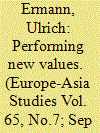

|
|
|
|
|
| Publication |
2013.
|
| Summary/Abstract |
In post-socialist societies, marketing and consumption play a crucial role for what is regarded as value. Assuming 'consumer capitalism' as an important feature of the neoliberal project, I argue that marketing theories and practices produce market societies in Eastern and Central Europe. To highlight the reflexive adaptation of 'consumer capitalism' by producers, marketers and consumers, this essay discusses fashion brand promotion in Bulgaria. The case studies illustrate how the transformation of modes of valuation can be understood as a process of performative modernisation and marketisation. It appears that the 'local' adjustment of 'global' concepts of marketing and consumption leads to new formations of value in spatial, temporal and subjective terms.
|
|
|
|
|
|
|
|
|
|
|
|
|
|
|
|
| 7 |
ID:
090282
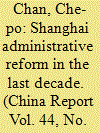

|
|
|
|
|
| Publication |
2008.
|
| Summary/Abstract |
Since the last decade, the Shanghai government has carried out administrative reforms towards the goals of rationalisation and marketisation. Various reform measures have been implemented, including, for example, segregation of government and enterprises (zheng qi fen kai); reduction of administrative examination and approval (jianshao xingzheng shenpi); and devolving some of the government functions to the third sector. Among various measures, probably the setting up of a new local government in the Pudong New Area is the most significant. After the examination of different aspects of the Shanghai administrative reforms, we conclude that the goal of the reform has been set correctly but without enough bold and innovative attempts. We suggest that further administrative reforms in Shanghai should be implemented with more rationalisation and marketisation in order to build up a true market economy without administrative interference from the government.
|
|
|
|
|
|
|
|
|
|
|
|
|
|
|
|
| 8 |
ID:
097919
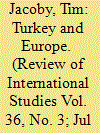

|
|
|
|
|
| Publication |
2010.
|
| Summary/Abstract |
This article argues that current discourses on Turkish corruption are marked by a disproportionate emphasis on culture and can thus be understood as part of a broader relationship with Europe's perennial 'other'. Having traced elements of this within European political elites' response to Turkey's prospective accession to the Union, the article goes on to suggest that the association of corruption with a different cultural orientation represents a useful means of legitimising the extraneous guidance of administrative and economic change. The ultimate aim of such reforms are, the article concludes, to extend the penetrative capacity of European capital, to reduce the transaction costs involved in acquiring Turkish assets and to disable domestic resistance to further marketisation.
|
|
|
|
|
|
|
|
|
|
|
|
|
|
|
|
|
|
|
|
|